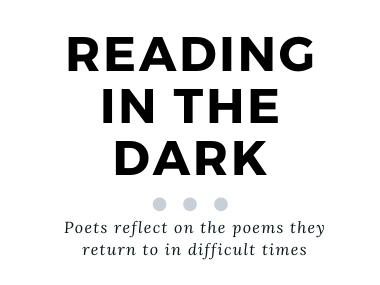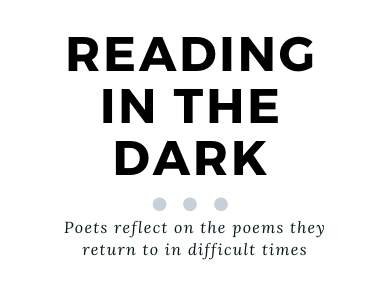Reading in the Dark
Mark Wunderlich on Rainer Maria Rilke’s “The First Elegy”

The First Elegy
Who, if I cried out, would hear me among the Angels’
Orders? and even if one of them pressed me
suddenly to his heart: I’d be consumed
in his more potent being. For beauty is nothing
but the beginning of terror, which we can still barely endure,
and while we stand in wonder it coolly disdains
to destroy us. Every Angel is terrifying.
And so I grip myself and choke down that call note
of dark sobbing. Ah, whom can we turn to
in our need? Not Angels, not humans,
and the sly animals see at once
how little at home we are
in the interpreted world. That leaves us
some tree on a slope, to which our eyes returned
day after day; leaves us yesterday’s street
and the coddled loyalty of an old habit
that liked it here, lingered, and never left.
O and the night, the night, when the wind full of worldspace
gnaws at our faces—, for whom won’t the night be there,
desired, softly disappointing, setting hard tasks
for the single heart. It is easier on lovers?
Ah, they only use each other to mask their fates.
You still don’t see? Fling the emptiness in your arms
out into the spaces we breathe; perhaps the birds
will feel the increase of air with more passionate flight.
Yes, the Springs needed you. Many a star was waiting
for your eyes only. A wave swelled toward you
out of the past, or as you walked by the open window
a violin inside surrendered itself
to pure passion. All that was your charge.
But were you strong enough? Weren’t you always distracted
by expectation, as though each such moment
presaged a beloved’s coming? (But where would you keep her,
with all those big strange thoughts in you
going and coming and sometimes staying all night?)
No, in the grip of longing sing women who loved;
their prodigious feeling still lacks an undying fame.
The abandoned ones you almost envy, since you found them
so much deeper in love than those whom love allayed.
Begin ever anew their impossible praise.
Remember: the hero lives on, even his downfall
was only a pretext for attained existence: his ultimate birth.
But nature, exhausted, takes women in love
back into herself, as though she lacked strength
to create them a second time. Have you praised Gaspara Stampa
intently enough that any girl left by her lover
will be moved by this heightened instance
of a woman’s heart to cry out: Let me be as she was!
Isn’t it time these most ancient sorrows
at last bore fruit? Time we tenderly detached ourselves
from the loved one, and trembling, stood free:
the way the arrow, suddenly all vector, survives the string
to be more than itself. For abiding is nowhere.
Voices, voices. Listen, my heart, the way
only saints have listened till now, as that vast call
lifted them from the ground; while they kept on kneeling
and noticed nothing, those impossible ones:
listeners fully absorbed. Not that you could bear
God’s voice—not at all. But listen to the wind’s breathing,
the unbroken news that takes shape out of silence.
It’s rustling toward you now from all the youthful dead.
When you entered a church in Rome or Naples,
didn’t their fate speak quietly to you?
Or an inscription echoed deep within you,
as, not long ago, that tablet in Santa Maria Formosa.
Their charge to me?—that I gently dispel
the air of injustice that sometimes
hinders a little their spirits’ pure movement.
Granted, it’s strange to dwell on earth no more,
to cease observing customs barely learned,
not to give roses and other things of such promise
a meaning in some human future:
to stop being what one was in endlessly anxious hands,
and ignore even one’s own name like a broken toy.
Strange, not to go on wishing one’s wishes. Strange,
to see all that was once so interconnected
drifting in space. And death exacts a labor,
a long finishing of things half-done, before
one has that feeling of eternity.—But the living
all make the same mistake: they distinguish too sharply.
Angels (it’s said) often don’t know whether they’re moving among
the living or the dead. The eternal current
sweeps all the ages with it through both kingdoms
forever and drowns their voices in both.
In the end, those torn from us early no longer need us:
slowly one becomes unaccustomed to earthly things,
in the gentle way one leaves a mother’s breast. But we, who need
such great mysteries, for whom so often blessed progress
springs from grief—: could we exist without them?
Is it a tale told in vain, that myth of lament for Linos,
in which a daring first music pierced the shell of numbness:
stunned Space, which an almost divine youth
had suddenly left forever; then, in that void, vibrations—
which for us now are rapture and solace and help.
"The First Elegy" from THE POETRY OF RILKE: BILINGUAL EDITION by Rainer Maria Rilke, translated and edited by Edward Snow. Translation © 2009 by Edward Snow. Reprinted by permission of North Point Press, a division of Farrar, Straus and Giroux. "The First Elegy" originally published in the volume THE DUINO ELEGIES.
In response to the Coronavirus pandemic, we asked poets to write about the poems they return to in difficult times—to find solace, perspective, or even a moment of delight. Subscribe to the PSA newsletter for more Reading In The Dark responses and to keep updated with the PSA.
Because a poem is also a kind of object—something seen from all sides like sculpture—it is also a place. We can occupy a poem, and the experience of being inside a poem grounds us, gives us a room in which we can take shelter. When I read Rilke’s Duino Elegies—particularly "The First Elegy"—I have a particular experience of being transported into a world of spirit, of being inside someone else’s dreams, dreaming with them. This poem and the others that follow it cry out and push against the constraints of mortality. They express anguish, they philosophize, reach a kind of resolve. They speak from a posthumous world beyond our world, one from which we are separated by a membrane that is very thin.
Rilke began the first Duino Elegy in 1912 while walking along the cliffs near Duino Castle in Trieste (the castle would be largely destroyed during WWI). Two years later, the poet would be separated from his family and from his home to which he would never return. He would be conscripted into military service, and would suffer from illness and depression; it took him ten more years to complete the cycle of ten poems. Rereading them now, they allow me to move backwards and forwards in time, occupy simultaneously the world of the spirit, and that of our own collective trauma. They reassure me that our circumstances are temporary, and while inside them, I can believe that beyond this world lies a brighter existence lit by power these poems describe.
—Mark Wunderlich
Mark Wunderlich is the author of four books of poetry, the most recent of which is God of Nothingness, forthcoming from Graywolf Press. His other collections include The Earth Avails, which received the Rilke Prize, Voluntary Servitude, and The Anchorage, which received the Lambda Literary Award. He is the director of the Bennington Writing Seminars graduate writing program and lives in New York’s Hudson Valley.

